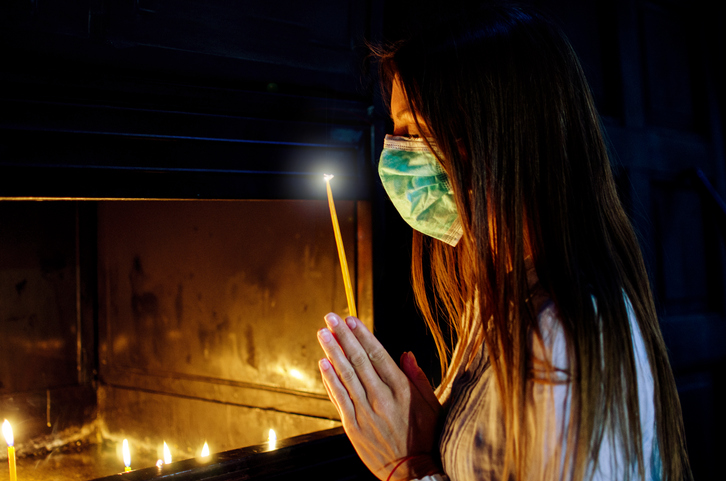
While we continue living through the COVID-19 pandemic, it’s easy to see how it has affected us on a number of levels. This pandemic can impact individuals from an emotional, mental, and physical standpoint. In addition, it can even impact a person’s spiritual wellness.
During a time such as a pandemic, it’s easy to imagine how one can feel as if their sense of spirituality is being challenged, even if they are not religious themselves (Starratt, 2020). Beyond this, the global upheaval caused by the pandemic’s effects has caused significant uncertainty for various aspects of our lives, which can cause some to question their life’s overall meaning (Salve, 2020).
In times of unprecedented crisis, it’s important to find wellness and peace. Here is how you can help your clients maintain their spiritual wellness during the pandemic.
Understanding How the Pandemic Affects People on a Spiritual Level
The meaning of spirituality can be described as “the aspect of humanity that refers to the way individuals seek and express meaning and purpose and the way they experience their connectedness to the moment, to self, to others, to nature, and to the significant or sacred,” even if this does not necessarily entail one practicing religion (Berger, 2020).
Those wanting to become a wellness counsellor may know that the pandemic can affect spirituality in many different ways. For clients who are devoutly religious, the pandemic can be a problem for them in the sense that they cannot practice their faith in person, and instead must do so either online or at a drive-in service. Although it’s a necessary measure during the pandemic, it doesn’t replicate the feeling of togetherness and community one might feel while attending a service in person (Creech, 2020).

The ability to live in the present can also help people live life while acknowledging the guidance of a spiritual force (Burgess, 2020). Unfortunately, a crisis such as the COVID-19 pandemic can cause people to overwhelm themselves by investing too much into the future, rather than focus on living life in the present moment (Burgess, 2020). The spiritual impact of the pandemic can also manifest itself in positive ways, in that it can inspire people to show greater empathy and care toward others (Salve, 2020).
What Those Wanting to Become a Wellness Counsellor Can Do to Help
If a client has a desire to improve their spiritual wellness, there’s plenty that can be done during your wellness counsellor career. For example, you can encourage them to practice numerous habits to get more in touch with their sense of spirituality, such as meditation, developing their sense of purpose in life, helping other people who need it most, and searching for their inner peace (Chopra, 2020). By practicing habits like these, clients can develop a closer connection with their spirit and soul, and learn how to display kindness and generosity at a time when it is easier to run away from their anxious feelings than tackle them (Chopra, 2020). If clients are religious, you can encourage them to attend virtual services via streaming and teleconferencing platforms, so they can continue practicing their faith during a time of widespread physical distancing (Creech, 2020).

Additionally, the COVID-19 pandemic represents an opportunity for people to re-evaluate what they want from life. In this sense, you can encourage them to find ways to be productive and strive toward accomplishing a personal goal during this crisis, as this can improve their spiritual well-being and sense of purpose (Creech, 2020).
What’s important is for the client to find ways to occupy themselves that genuinely bring them happiness, in contrast to a task that feels like a chore or something they’re doing for the sake of doing something. For example, they could provide assistance to those in need, such as donating to organizations or engaging in socially-distanced activities with others (Creech, 2020). Whatever you decide to suggest for clients, helping them maintain or regain their spiritual wellness can help them turn a highly distressing moment in their life into something fruitful and positive, on a spiritual level and many others.
Do you want to start your wellness counsellor training?
Contact Rhodes Wellness College today!
Works Cited
Berger, E. J. (2020, April 15). Spiritual Health Matters in the COVID-19 Crisis – MedicineNet Health News. Retrieved from https://www.medicinenet.com/script/main/art.asp?articlekey=230240
Burgess, S. (2020, April 17). COVID-19 and spiritual life: Living one day at a time. Retrieved from https://www.mayoclinichealthsystem.org/hometown-health/speaking-of-health/covid-19-and-spiritual-life-living-one-day-at-a-time
Chopra, D. (2020, April 03). Deepak Chopra: The coronavirus and the need for spiritual well-being. Retrieved from https://www.cnbc.com/2020/04/03/deepak-chopra-the-coronavirus-and-need-for-spiritual-wellness.html
Creech, W. (2020, April 5). Building your spiritual life during changes brought about by the COVID-19 pandemic. Retrieved from https://www.mayoclinichealthsystem.org/hometown-health/speaking-of-health/building-your-spiritual-life-during-covid-19-changes
Salve, S. (2020, March 24). A Personal Reflection on COVID-19’s Spiritual Impact. Retrieved from https://www.internationalhealthpolicies.org/blogs/a-personal-reflection-on-covid-19s-spiritual-impact/
Starratt, K. (2020, June 15). Testing faith: Spirituality in the face of tragedy and COVID-19 in Nova Scotia: Cape Breton Post. Retrieved from https://www.capebretonpost.com/lifestyles/regional-lifestyles/testing-faith-spirituality-in-the-face-of-tragedy-and-covid-19-in-nova-scotia-462309/









